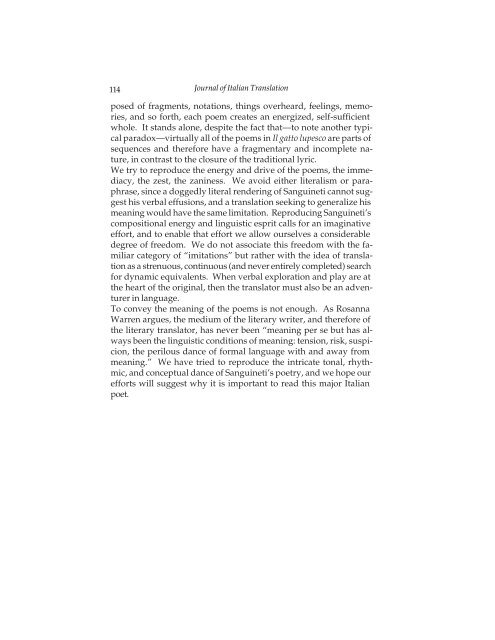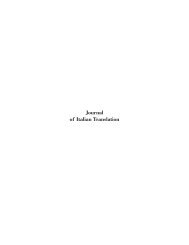Journal of Italian Translation - Brooklyn College - Academic Home ...
Journal of Italian Translation - Brooklyn College - Academic Home ...
Journal of Italian Translation - Brooklyn College - Academic Home ...
You also want an ePaper? Increase the reach of your titles
YUMPU automatically turns print PDFs into web optimized ePapers that Google loves.
114<br />
<strong>Journal</strong> <strong>of</strong> <strong>Italian</strong> <strong>Translation</strong><br />
posed <strong>of</strong> fragments, notations, things overheard, feelings, memories,<br />
and so forth, each poem creates an energized, self-sufficient<br />
whole. It stands alone, despite the fact that—to note another typical<br />
paradox—virtually all <strong>of</strong> the poems in Il gatto lupesco are parts <strong>of</strong><br />
sequences and therefore have a fragmentary and incomplete nature,<br />
in contrast to the closure <strong>of</strong> the traditional lyric.<br />
We try to reproduce the energy and drive <strong>of</strong> the poems, the immediacy,<br />
the zest, the zaniness. We avoid either literalism or paraphrase,<br />
since a doggedly literal rendering <strong>of</strong> Sanguineti cannot suggest<br />
his verbal effusions, and a translation seeking to generalize his<br />
meaning would have the same limitation. Reproducing Sanguineti’s<br />
compositional energy and linguistic esprit calls for an imaginative<br />
effort, and to enable that effort we allow ourselves a considerable<br />
degree <strong>of</strong> freedom. We do not associate this freedom with the familiar<br />
category <strong>of</strong> “imitations” but rather with the idea <strong>of</strong> translation<br />
as a strenuous, continuous (and never entirely completed) search<br />
for dynamic equivalents. When verbal exploration and play are at<br />
the heart <strong>of</strong> the original, then the translator must also be an adventurer<br />
in language.<br />
To convey the meaning <strong>of</strong> the poems is not enough. As Rosanna<br />
Warren argues, the medium <strong>of</strong> the literary writer, and therefore <strong>of</strong><br />
the literary translator, has never been “meaning per se but has always<br />
been the linguistic conditions <strong>of</strong> meaning: tension, risk, suspicion,<br />
the perilous dance <strong>of</strong> formal language with and away from<br />
meaning.” We have tried to reproduce the intricate tonal, rhythmic,<br />
and conceptual dance <strong>of</strong> Sanguineti’s poetry, and we hope our<br />
efforts will suggest why it is important to read this major <strong>Italian</strong><br />
poet.
















